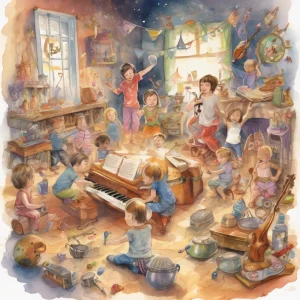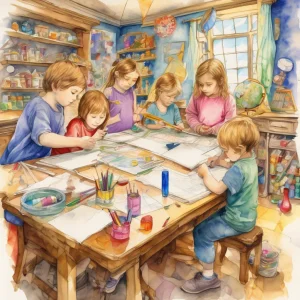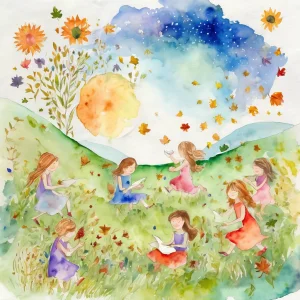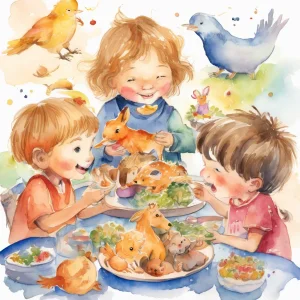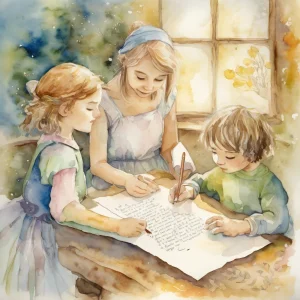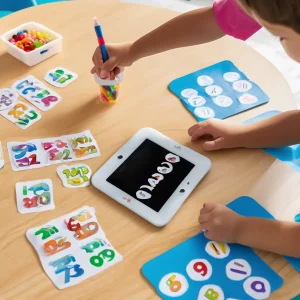Activity
Similar Activities
Musical Journey Through Time and Space - Instrument Exploration
Children’s Age: 3–4 years
Activity Duration: 15 minutes
Embark on a creative musical journey with children aged 36 to 48 months to boost their communication, self-care, and play skills. Use household items as instruments, set up a perfo…
Activity Duration: 15 minutes
Nature-Inspired Drawing Activity
Children’s Age: 8–9 years
Activity Duration: 10 – 25 minutes
An outdoor activity where children draw natural elements to foster creativity and ecological awareness.
Activity Duration: 10 – 25 minutes
Ecosystem Adventure Board Game - Nature's Quest
Children’s Age: 7–9 years
Activity Duration: 10 – 25 minutes
An interactive board game where children explore and learn about ecosystems through challenges and tasks.
Activity Duration: 10 – 25 minutes
Enchanted Measurement Adventures: Measuring Real-World Objects Scavenger Hunt
Children’s Age: 5–10 years
Activity Duration: 10 – 20 minutes
An educational activity engaging children in measuring real-world objects through a fun scavenger hunt.
Activity Duration: 10 – 20 minutes
Whispers of the Seasons: Seasonal Collage Exploration
Children’s Age: 5–6 years
Activity Duration: 10 minutes
Engaging activity where children create collages representing different seasons.
Activity Duration: 10 minutes
Animal Feast Adventure: A Whimsical Feeding Frenzy
Children’s Age: 5–8 years
Activity Duration: 10 – 25 minutes
An interactive activity where children feed toy animals with pretend food, promoting communication skills and adaptive development.
Activity Duration: 10 – 25 minutes
Nature's Objects: Exploring Buoyancy Adventure
Children’s Age: 6–7 years
Activity Duration: 10 minutes
An engaging hands-on activity for children aged 6-7 to explore buoyancy with natural objects.
Activity Duration: 10 minutes
Gratitude Journey: Writing Thank-You Notes Experiment
Children’s Age: 6–8 years
Activity Duration: 10 – 20 minutes
A creative activity for children aged 7-8 to write thank-you notes, enhancing cognitive and communication skills.
Activity Duration: 10 – 20 minutes
Symmetry Magic: Reflective Art Adventure
Children’s Age: 7–10 years
Activity Duration: 10 – 25 minutes
This activity involves exploring symmetry through a creative and interactive art project for children aged 7-10 years.
Activity Duration: 10 – 25 minutes
Enchanted Discovery: Nature Scavenger Hunt with a Twist
Children’s Age: 7–8 years
Activity Duration: 10 minutes
An outdoor educational activity for children aged 7-8 involving a nature scavenger hunt with historical items, leading to a nature collage creation.
Activity Duration: 10 minutes
Bridge Builders: Eco Teamwork and Critical Thinking
Children’s Age: 8–9 years
Activity Duration: 10 – 25 minutes
An eco-conscious activity where children build bridges using popsicle sticks and tape to support toy cars, promoting teamwork and environmental awareness.
Activity Duration: 10 – 25 minutes
Musical Kindness Quilt
Children’s Age: 8–10 years
Activity Duration: 10 – 20 minutes
The "Musical Kindness Quilt" activity engages 9-year-old children in learning about famous musicians while enhancing communication skills and cognitive development. Children choo…
Activity Duration: 10 – 20 minutes




